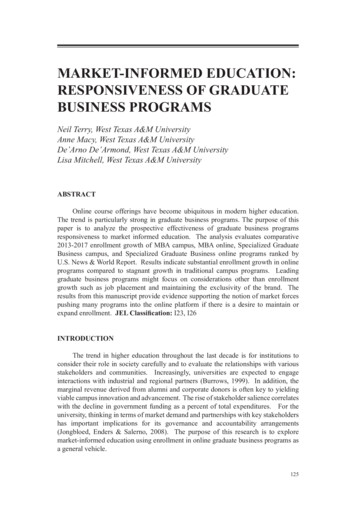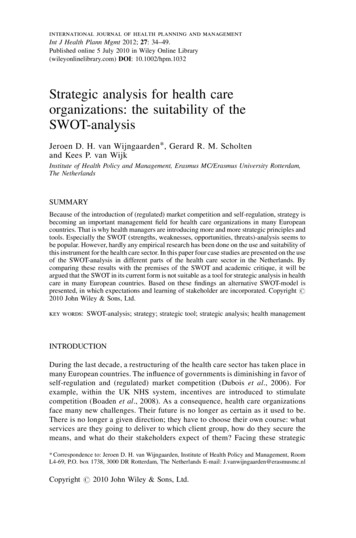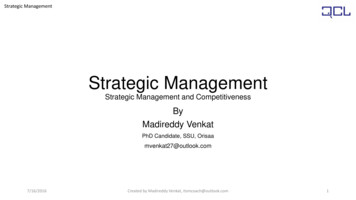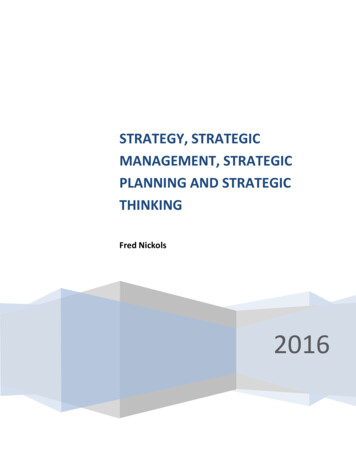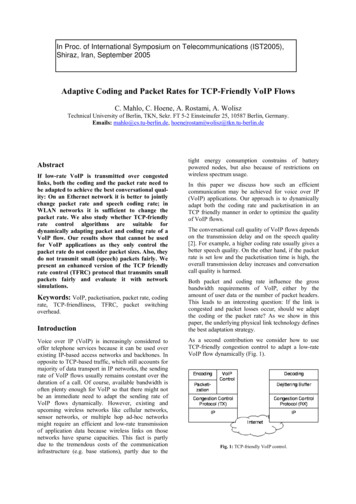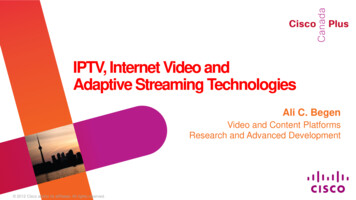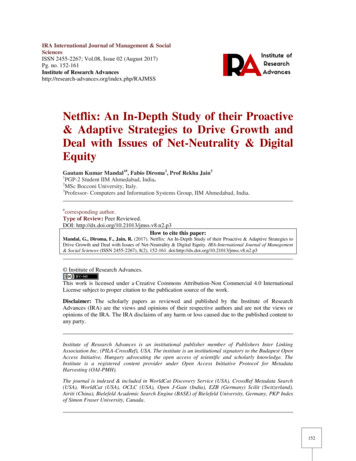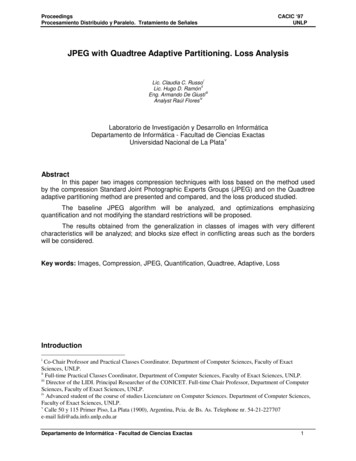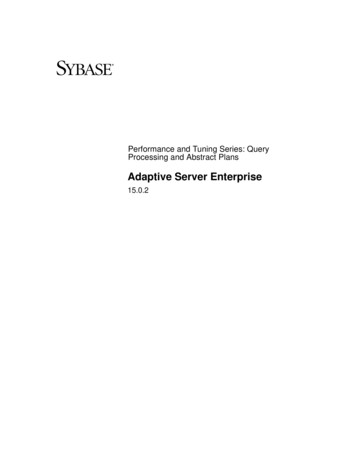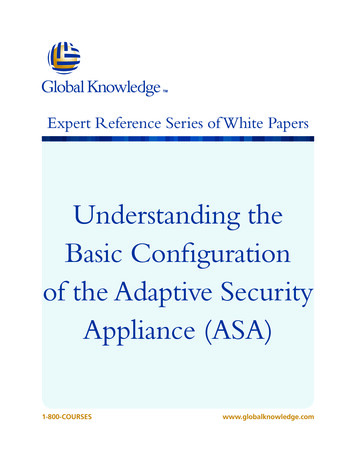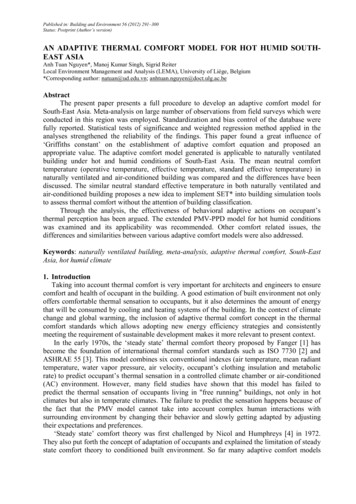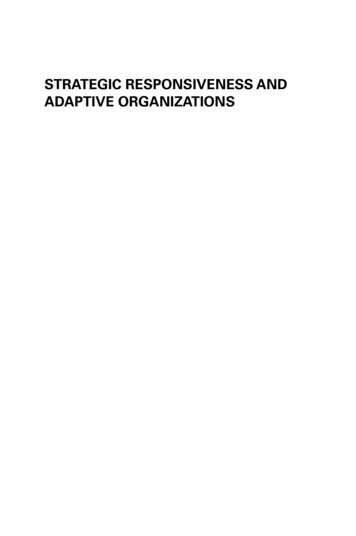
Transcription
STRATEGIC RESPONSIVENESS ANDADAPTIVE ORGANIZATIONS
This page intentionally left blank
STRATEGICRESPONSIVENESS ANDADAPTIVE ORGANIZATIONS:NEW RESEARCH FRONTIERSIN INTERNATIONALSTRATEGIC MANAGEMENTEmerald Studies in Global StrategicResponsivenessEDITED BYTORBEN JUUL ANDERSENCopenhagen Business School, DenmarkSIMON TORPUniversity of Aarhus, DenmarkSTEFAN LINDERESSEC Business School, Paris, FranceUnited Kingdom – North America – Japan – India – Malaysia – China
Emerald Publishing LimitedHoward House, Wagon Lane, Bingley BD16 1WA, UKFirst edition 2019Copyright 2019 Emerald Publishing LimitedReprints and permissions serviceContact: permissions@emeraldinsight.comNo part of this book may be reproduced, stored in a retrieval system, transmitted inany form or by any means electronic, mechanical, photocopying, recording orotherwise without either the prior written permission of the publisher or a licencepermitting restricted copying issued in the UK by The Copyright Licensing Agencyand in the USA by The Copyright Clearance Center. Any opinions expressed in thechapters are those of the authors. Whilst Emerald makes every effort to ensure thequality and accuracy of its content, Emerald makes no representation implied orotherwise, as to the chapters’ suitability and application and disclaims any warranties,express or implied, to their use.British Library Cataloguing in Publication DataA catalogue record for this book is available from the British LibraryISBN: 978-1-78973-012-8 (Print)ISBN: 978-1-78973-011-1 (Online)ISBN: 978-1-78973-013-5 (Epub)
ContentsList of Contributors viiForeword ixChapter 1 Introduction: Adaptive Strategy-making inTurbulent EnvironmentsTorben Juul Andersen, Simon Torp, and Stefan Linder 1Chapter 2 Strategic Flexibility in Turbulent Times:Impact of CEO’s Willingness and Permission to ChangeJulian Hess and Tessa Flatten 9Chapter 3 Exploring Adaptive Small and Medium Enterprisesthrough the Lens of Open StrategyAylin Ates 25Chapter 4 Autonomy and Leadership Support asAntecedents to Intrapreneurship: Value of VignetteExperiments for Research on Strategic ResponsivenessStefan Linder 41Chapter 5 Achieving Adaptive Responsiveness throughStrategic Planning, Autonomous Strategic Actions, andInteractive ControlsTorben Juul Andersen and Simon Torp 61Chapter 6 Strategic Responsiveness of Medium-sizedEnterprises During an Economic and Financial Crisis:Antecedents of ResilienceMaria Iborra, Vicente Safón, and Consuelo Dolz 81
viContentsChapter 7 Perceiving the Present by Means of the Past:Theorizing the Strategic Importance of Corporate ArchivesWim van Lent and Andrew D. Smith 97Chapter 8 Temporary Incorporation as a Mechanism of StrategicResponsiveness: The BBC’s Digital Transformation, 1992–2015Bilal Ahmed Jathol and Charles-Clemens Rüling 111Index 125
List of ContributorsTorben Juul Andersen is a Professor of Strategy and International Managementat the Copenhagen Business School and Director of the Center for Global Strategic Responsiveness, Department of International Economics, Government andBusiness.Aylin Ates is a Senior Lecturer in Strategy at the Department of ManagementScience at Strathclyde Business School, Glasgow. She is a Director of the MSc inProject Management and Innovation Programme. Her research is published in,for example, International Journal of Operations and Production Management andInternational Journal of Production Research.Consuelo Dolz is an Associate Professor at the Department of Business Administration “Juan José Renau,” University of Valencia, Spain. Her research has beenfocused on mergers and acquisitions, specifically the integration process, ambidexterity at SMEs – antecedents and consequences, family firms, and social corporate responsibility.Tessa Flatten is a Professor at the TU Dortmund University as part of the Facultyof Business and Economics. Her key research interests focus on innovation management, entrepreneurship, and technology management topics.Julian Hess is a Doctoral Candidate at the Faculty of Business and Economics,TU Dortmund University. His research is focused on strategy, innovation management, and digitalization in technology-based companies.Maria Iborra is an Associate Professor at the Department of Business Administration “Juan José Renau,” University of Valencia, Spain. Her research covers thefield of strategic management with specific focus on upper echelons and their rolein creating ambidexterity in SMEs as well as Social Corporate Irresponsibility, itsantecedents, and consequences.Bilal Ahmed Jathol is an Assistant Professor of Strategy and Entrepreneurship atNeoma Business School in Reims, France. He holds a PhD from Grenoble Ecolede Management, and his research focuses on organizational and entrepreneurialresponses to change. His research mainly based on qualitative methods has beenpublished in M@n@gement and presented at international conferences.
viiiList of ContributorsWim van Lent is an Assistant Professor at the Montpellier Business School,France. His research focuses on the role of history in management and businessdevelopment. He is an Associate Editor with the Journal of Management History.Stefan Linder is an Associate Professor with the Accounting and ManagementControl Department at the ESSEC Business School in Paris. He has written several books and academic articles on topics like strategic management control,strategic planning, entrepreneurship, incentives, and governance design.Charles-Clemens Rüling is a Professor of Organization Theory and AssociateDean for Research at Grenoble Ecole de Management, France. His researchfocuses on processes of organizational and institutional change. He is an Associate Editor of Long Range Planning, and his work has been published in Academyof Management Journal, Entrepreneurship Theory and Practice, and OrganizationStudies.Vicente Safón is an Associate Professor at the Department of Business Administration “Juan José Renau,” University of Valencia, Spain. His research is focusedon strategic management, the role of upper echelons on ambidexterity, and themanagement and reputation of universities.Andrew D. Smith is a Senior Lecturer in International Business, Strategy andEntrepreneurship and Director of Studies for International Business at the University of Liverpool Management School, UK. His research interests focus on theevolution of business and financial institutions, international business development, corporate governance, and political economy.Simon Torp is an Associate Professor, Department of Business Development andTechnology, Aarhus University. He has written extensively on ownership effects,leadership style, middle-management engagement, investment planning, management control, risk management, and employee competences.
ForewordWhereas the strategy field covers a broad spectrum of research ranging fromcorporate strategy, M&As, product-market strategies, and business innovationto strategic renewal and sustainable adaptation, there appears to be an urgentneed to focus on how firms act in turbulent environments and successfully adapttheir business activities. Firms today operate in a business environment thatincreasingly seems to be characterized by abrupt, unpredictable events, includingfinancial and economic crises, international political conflicts, and environmental challenges. Furthermore, the underlying challenges are often globally universal and require collaborative solutions where individual organizations only canexcel in firm-specific responses in the short term. This development implies thatbusiness conditions are becoming increasingly uncertain and characterized by attimes very extreme and unforeseeable outcomes. This calls for swift(er) responsesto adapt the business and requires new thinking that can extend prior research.The recently completed conference EURAM 2018 held in Reykjavik, Iceland, organized by the European Academy of Management, responded to thisneed for new thinking and introduced a new research track associated with theStrategic Interest Group focused on Strategic Management. The title of the newtrack was Strategic Responsiveness and Adaptive Organizations and was proposedand managed by the three editors of this volume that adopts the same title. Thetrack attracted a number of highly relevant and very interesting contributionspresented at various sessions during the three-day conference.The current volume of the Emerald book series on Global Strategic Responsiveness presents a selection of these research efforts presented at the EURAM2018 conference on the theme of Strategic Responsiveness and Adaptive Organizations. They offer promising ideas about how to deal with the current strategic challenges, and we thank the contributors for their willingness to share theirthinking and findings and hope the readers will find each of the chapters stimulating as a potential foundation to extent this important work into the future.Torben Juul Andersen, Simon Torp,and Stefan Linder
This page intentionally left blank
Chapter 1Introduction: Adaptive Strategy-makingin Turbulent EnvironmentsTorben Juul Andersen, Simon Torp, and Stefan LinderAbstractThis first chapter argues that turbulent environments require adaptivestrategy for survival and continued prosperity and thereby introducesthe attempts to determine effective response capabilities in contemporaryfirms, which are presented in the ensuing chapters. The background inprior strategy research is outlined to position the various contributionswithin a proper backdrop as potential extensions to prior insights generated in the strategic management field. It suggests a need for multiplemethodological approaches to gain new diverse and relevant knowledgefrom rich qualitative field studies as well as quantitative data probes andcomputational analyses. Finally, the ensuing chapters are briefly presentedto provide a coherent view of the contributions made by this specific collection of chapters that the authors hope will inspire and fuel ongoingwork in this important area.Keywords: Autonomy; dispersed decision-making; emergence; openstrategy; planning; practices; strategic responsivenessIntroductionThe global business environment that exposes contemporary firms constitutes anonlinear dynamic complex system in constant flux where extreme events canhappen abruptly and in many cases with outcomes that are impossible to predictbased on prior trends. The noticeable consequence of this setting is displayedin extreme corporate performance outcomes that follow power distributionsrather than the neat features of commonly assumed Gaussian trajectories.Strategic Responsiveness and Adaptive Organizations:New Research Frontiers in International Strategic Management, 1–8Copyright 2019 by Emerald Publishing LimitedAll rights of reproduction in any form reserveddoi:10.1108/978-1-78973-011-120191001
2Torben Juul Andersen et al.This questions conventional ways of thinking about the strategic managementchallenges and the way we approach empirical studies to inform these challenges.We cannot solely rely on analytical methodologies that make stringent assumptions about normality in the data, and we need to think creatively about how tocomplement quantitative and qualitative research approaches to gain new important insights about how effective responsive strategies arise in real organizations.The turbulent business environment requires that firms be able to take immediate responsive actions that allow the organization to experiment and learnabout what works under new circumstances and use these insights to adapt thecorporate business operations to obtain a better fit with the changing conditions.The emerging environmental context is characterized by increasingly specialized,but interrelated and co-evolving business activities where corporate responsecapabilities must satisfy the need for requisite variety across available solutions.This may need delegation of authority allowing more autonomy to experimentwith new ventures throughout the organization in search for better future solutions. The extant strategy literature is cognizant about this and provides bothanecdotal and empirical evidence in support. However, there is also a realization that s trategy-making processes need guidance by rational forward-lookinganalyses to be effective, which uncovers seemingly contradictory requirements fordecentralized exploratory responses and central analytical planning processes.The reconciliation of these opposing perspectives is obviously that they (must)interact in an ongoing manner, although there is no clear evidence as to howexactly that should be carried out to be effective and gain a sustainable adaptation of the strategy.In short, corporate success and longevity seem to depend on abilities to sensenew developments in the environment as they emerge and respond to them inproactive, timely, and guided ways. Besides delegation, this calls for enhancedsharing of updated information among people across different levels and functions in the organization including employees with deep business insights andexecutive decision makers with long-term strategic responsibilities. That is, theability to integrate experiential knowledge from current actions and initiativesthat try out new ways of responding into the forward-looking strategy considerations seems to be an essential feature of effective strategic responses capabilities.However, organizational agents also need to be motivated to pursue the proposedbehaviors, which raise other subtle concerns about broader governance issues likecorporate values and executive leadership traits as very important antecedents foreffective strategy adaptation.However, the reality is that we do not know much about how these intricateelements and processes are enacted effectively in today’s organizations. Hence,there is an apparent need to theorize about, analyze, identify, and model effectivestrategic
field of strategic management with specific focus on upper echelons and their role in creating ambidexterity in SMEs as well as Social Corporate Irresponsibility, its antecedents, and consequences. Bilal Ahmed Jathol is an Assistant Professor of Strategy and Entrepreneurship at Neoma Business School in Reims, France. He holds a PhD from Grenoble EcoleAuthor: Torben Juul AndersenPublish Year: 2019
